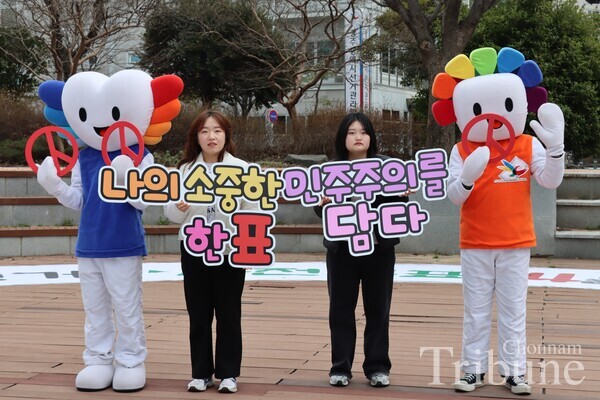
The youth’s political apathy is higher than in any other age group. The voter turnout reveals it. According to the National Election Commission, people in their 20s and 30s had a voter turnout of 59 percent and 57 percent in the 21st general election held in 2020, while people in their 40s, 50s, and 60s recorded about 64 percent, 70 percent, and 80 percent respectively. In the 2022 presidential election, people in their 20s and 30s had the lowest voter turnout, with around 70 percent, except for those over 80. To make matters worse, in the 8th local election held three months after the presidential election in 2022, only 30 percent of young voters in the 20 to 30 age group cast their ballots.
Some people say that political apathy among the youth is something from the past. In fact, young people are making their voices heard through various social media. Their political participation has increased compared to the past few decades. However, the youth’s political interest is still lower than that of other generations, as indicated by the relative voter turnout. In this issue, the Chonnam Tribune looked into the causes and solutions of the youth’s political apathy through interviews with young people and experts ahead of the upcoming general election on April 10.
The Gap Between Youth and Politics
The causes of the youth’s political apathy are diverse. Noh Hyeon-min (Senior, Dept. of Political Science and International Relations) said, “To be honest, I think it is because young people are not interested in anything except for issues related to themselves. We are so busy studying and getting jobs that we cannot afford to pay attention to politics. It can be seen as shortsighted, but societal structure also plays a part.” Park Jong-seok (Junior, Dept. of Animal Resources) mentioned, “The youth is becoming indifferent to politics due to the enforcement of policies that do not directly affect them.” They feel that politics does not affect young people that much.
Lee Soo-rim (Sophomore, Dept. of Electronic Engineering) noted, “It seems that the mood of active political participation among young people has not been created. There are no political activities related to them.” Park Yeon-ju (Junior, Dept. of Political Science and International Relations) commented in the same vein, “There are few opportunities to get education about politics. We start to get interested in politics when learning about how politics work, but education systems that teach politics are nonexistent around us.” What can be found in common in their remarks during the interview was the absence of interaction and connectivity between the youth and politics.
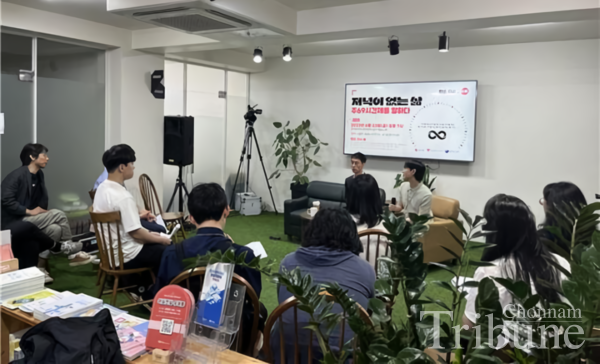
Young People Must Engage in Politics
Many young people think politics is an activity that is not related to them. This tendency results in political apathy, and ultimately, political indifference leads to social problems that eat away at the youth. Why is it a problem for them? People Power Party Former Vice-Spokesperson Kwak Seung-yong said, “From the youth’s point of view, much as they are not interested in politics, it is difficult to reflect their voices in the political world. Politics is about solving problems that individuals cannot solve alone through community. Therefore, the requirements of those not interested in this process are put on the back burner.” Simply put, political apathy makes it impossible for one’s generation to demand what they want or reject what is problematic.
Lim Myung-gyu, representative of Gwangju Youth Policy Network said, “It is the political community that has the authority to make decisions about significant parts of one’s life. Only when there are people who pay close attention to it, can they find out a particular phenomenon or policy has a problem. If there is no political interest, political issues that can work against young people, such as the current national pension system, can continue to be created and maintained.” For these reasons, they should be concerned with politics and actively participate in the area, whether its size is small or big.
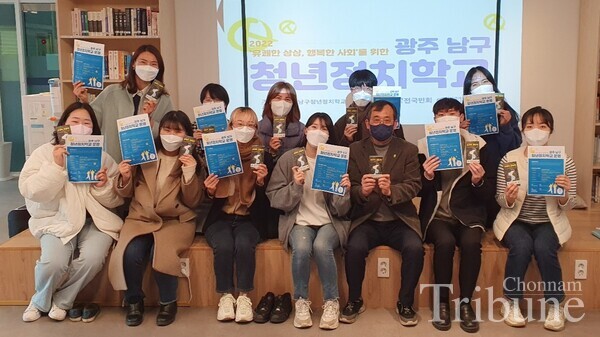
Policies and Political Education for Youth Engagement
Representative Lim highlights that well-established youth policies can sufficiently influence young people’s interest in politics. But at the same time, he explains that youth policies should be finely designed as it is in a highly specialized area. As part of social participation, Gwangju district offices are operating various programs in which young people can be involved in making policies; for instance, the Youth Participation Committee in Dong-gu Office. Through these activities, they can increase political interest by proposing youth policies related to them. Representative Lim, however, warns that low-quality results can be produced if the system is operated formally without understanding youth policies.
In the case of the Seo-gu Youth Policy Participation Group, practical policy proposals were not made due to the low participation rate of young people for the last two years, from 2022 to 2023. It is pointed out that participation was neglected because of their inadequate understanding of the policy-making process. Shim Inok, an official from the Seo-gu Office evaded giving a specific answer to the question. In response, she said, “The group consists mainly of workers and university students busy working and studying. We cannot force them to attend. So, we are thinking of utilizing incentives for voluntary participation.”
In another way, Rim Hyung-taek, an honorary professor at Gwangju University, emphasizes the need for political education to solve political indifference. “Political education makes people interested in the social community, cultivates the power to empathize, and enables them to make correct political decisions.” Professor Rim has experience in setting the stage for political education for young people by running Nam-gu Youth Political School in 2022. He said, “It is hard to say that the political school I used to run was a complete success. However, if we take time to reflect and cultivate a sense of solidarity through such social participation, we can see what kind of politics we should pursue. This kind of political education is the first step toward resolving political apoliticism.”
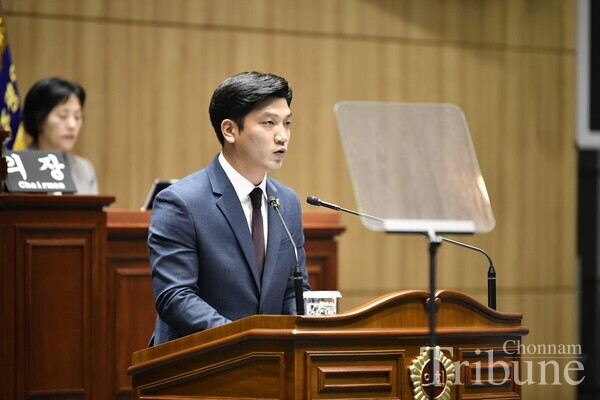
Younger, Better Representation
The former vice-spokesman Kwak claims that more young politicians should make their debut to solve youth apoliticism. “They should be able to sit in positions of practical authority and realize what young people truly desire.” However, he thinks too much money is needed to be a politician. That is why he suggests expanding a system that relieves the financial burden on young people running for elections, such as deposit reduction. Lee Myeong-no, a member of the Gwangju City Council, also argues that there should be more young politicians. “Young people have never seen the process or outcome made through the politics in their life. In other words, they have hardly felt a sense of political efficacy. That is because current politics are not focused on young people. It justifies that we need young politicians who represent the youth well.” He agrees that young politicians can handle youth-related agendas much more comfortably than older politicians.
However, unlike the former vice spokesman Kwak, the city council member Lee asserts that structural problems are minor in producing young politicians in Korean society. Instead, he underlines that it is essential to establish a wage system up to a level where politicians can live without worrying about financial problems. “The structure is well established. What’s more necessary is that the government should guarantee that politicians can be recognized as professionals.” Although Kwak and Lee have different ideas in that the former thinks initial cost and the latter thinks wage guarantee is a problem when discussing the difficulty of cultivating young politicians, they share their thoughts that a young person of ability, not money, should be a politician; and more young politicians are needed. As evidenced by their argument, in the current 21st National Assembly, the proportion of young politicians in their 20s and 30s is only 4.3 percent, the lowest among OECD countries.
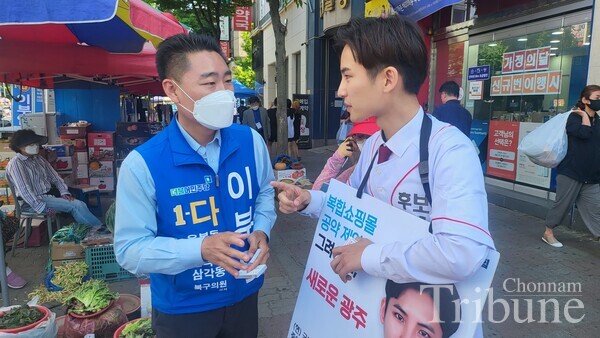
Vote for the Future You Want
Three keywords can address youth political apathy: Youth policies, youth political education, and young politicians. Since each generation’s circumstances and viewpoints considerably differ, the younger generation should be responsible for their problems. How long will they be waiting for the older generation to solve them? Lim said, “A powerful force that directly affects our lives lies in politics. Here is why we should be interested in politics. Furthermore, participation is needed beyond interest. It is important to find political issues in your life before choosing a political party or politician.” By doing that, the youth may find politicians and policies that genuinely represent themselves. In the same vein, voting is an act of expressing such hope. Vote for the candidate who corresponds with your opinion. Then, the day will come when that small vote eventually changes the direction of the world.
By Choi Daniel, Reporter

